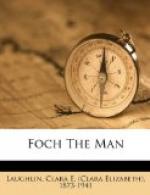The book was published in January, 1912, if I remember rightly, and was almost immediately translated into German. And I was told that one hundred thousand copies were sold in Germany in a very short time, and it was made the subject of editorials in nearly every prominent German paper.
Probably Foch read it. He may even have discussed it with the author. But he held to the belief that when the attack came it would come through Nancy.
He was not, however, expecting it when it came.
[1] The reason I cannot give his name, nor quote directly from his book, is that a fellow-traveler borrowed the book from me and I have never seen it since.
XII
ON THE EVE OF WAR
In the first days of July, 1914, divisional maneuvers were held as usual in Lorraine. Castelnau and Foch reviewed the troops, known throughout the army as “the division of iron.”
A young captain, recently assigned from the School of War to a regiment of Hussars forming part of the Twentieth army corps, wrote to his parents on July 5 an account of the maneuvers in which he had just taken part. He said that “the presence of these two eminent men gave a great interest” to the events he described. And the impression made upon him by Foch is so remarkable that his letter is likely to become one of the small classics of the war—endlessly reproduced whenever the story of Foch is told.
“General Foch,” he reminds his parents, “is a former commander of the School of War, where he played, on account of his great fitness, a very remarkable role.
“He is a man still young [he was almost 63!], slender and supple, and rather frail; his powerful head seems like a flower too heavy for a stem too slight.
“What first strikes one about him is his clear gaze, penetrating, intellectual, but above all and in spite of his tremendous energy, luminous. This light in his eyes spiritualizes a countenance which otherwise would be brutal, with its big mustache bristling above a very prominent, dominant jaw.
“When he speaks, pointing lessons from the maneuver, he becomes animated to the extent of impassionedness, but never expressing himself otherwise than with simplicity and purity.
“His speech is sober, direct; he affirms principles, condemns faults, appeals to our energies in a brief but comprehensive style.
“He is a priest, who judges, condemns, and instructs in the name of the faith which illumines him and to which he has consecrated all the powers of his mind and his heart. General Foch is a prophet whom his God transports.”
The young officer who wrote thus to his parents was Captain Andre Dubarle; and he later laid down his life for his country on the field of honor commanded by General Foch.
The letter seems to me as treasurable for what it conveys to us of the sort of young man Foch found among his officers and soldiers (there were many such!) as for what it tells us of the impression Foch created even in those days before men’s souls were set on fire with fervor for France.




